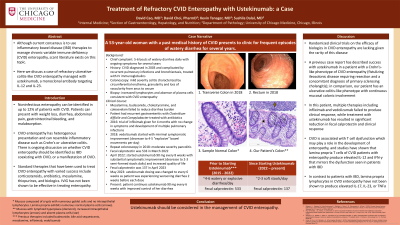Sunday Poster Session
Category: IBD
P0987 - Treatment of Refractory CVID Enteropathy With Ustekinumab
Sunday, October 27, 2024
3:30 PM - 7:00 PM ET
Location: Exhibit Hall E

Has Audio
.jpg)
David Cao, MD
University of Chicago Medicine
Chicago, IL
Presenting Author(s)
David Cao, MD1, David T. Choi, PharmD2, Sushila Dalal, MD2
1University of Chicago Medicine, Chicago, IL; 2University of Chicago Medicine, Inflammatory Bowel Disease Center, Chicago, IL
Introduction: Though consensus is to use IBD therapies to manage chronic variable immune deficiency (CVID) enteropathy, scant literature exists on this topic. Here we discuss a case of CVID enteropathy refractory to multiple therapies managed with ustekinumab.
Case Description/Methods: A 53 year old woman with CVID diagnosed in 2003 complicated by bronchiectasis like disease on IVIG presented in 2015 with 5-6 bouts of watery diarrhea daily for several years. Colonoscopy showed mild colitis characterized by circumferential erythema, granularity and loss of vascularity from anus to cecum. Biopsy had increased lymphocytes and absence of plasma cells consistent with CVID enteropathy. Mesalamine, budesonide, cholestyramine, and colesevelam failed to reduce her diarrhea burden, and she had recurrent gastroenteritis with Clostridium difficile and Campylobacter treated with antibiotics. From 2016 to March 2022, she was treated with infliximab followed by vedolizumab with minimal symptomatic improvement. During this time, she developed recurrent pulmonary infections every few months. Repeat colonoscopy in 2018 showed moderate severity colitis throughout the colon. She started ustekinumab 90 mg every 8 weeks in April 2022. Fecal calprotectin was 533 in March 2022. 8 months later, she reported 2-3 semi-formed stools daily and improved quality of life. Repeat fecal calprotectin was 137 in April 2023. Ustekinumab dosing was changed to every 6 weeks in May 2023 for worsening diarrhea 2 weeks before each dose. In the 2 years since starting ustekinumab, she developed just one pulmonary infection.
Discussion: Randomized clinical trials on the efficacy of biologics in CVID enteropathy are lacking. There has been one previous report of treatment of CVID enteropathy with ustekinumab, however, that patient’s phenotype included fistulizing ileocolonic disease requiring resection and a concomitant diagnosis of primary sclerosing cholangitis. CVID enteropathy is quite heterogenous, and our patient has an ulcerative colitis like phenotype with continuous mucosal colonic involvement. In this case, multiple therapies including infliximab and vedolizumab failed to produce clinical response, while treatment with ustekinumab has resulted in clinical remission and significant reduction in fecal calprotectin. Notably, while infliximab and vedolizumab treatment were associated with recurrent pulmonary infections in this patient, she has had a significant decrease in infections while on ustekinumab.
Disclosures:
David Cao, MD1, David T. Choi, PharmD2, Sushila Dalal, MD2. P0987 - Treatment of Refractory CVID Enteropathy With Ustekinumab, ACG 2024 Annual Scientific Meeting Abstracts. Philadelphia, PA: American College of Gastroenterology.
1University of Chicago Medicine, Chicago, IL; 2University of Chicago Medicine, Inflammatory Bowel Disease Center, Chicago, IL
Introduction: Though consensus is to use IBD therapies to manage chronic variable immune deficiency (CVID) enteropathy, scant literature exists on this topic. Here we discuss a case of CVID enteropathy refractory to multiple therapies managed with ustekinumab.
Case Description/Methods: A 53 year old woman with CVID diagnosed in 2003 complicated by bronchiectasis like disease on IVIG presented in 2015 with 5-6 bouts of watery diarrhea daily for several years. Colonoscopy showed mild colitis characterized by circumferential erythema, granularity and loss of vascularity from anus to cecum. Biopsy had increased lymphocytes and absence of plasma cells consistent with CVID enteropathy. Mesalamine, budesonide, cholestyramine, and colesevelam failed to reduce her diarrhea burden, and she had recurrent gastroenteritis with Clostridium difficile and Campylobacter treated with antibiotics. From 2016 to March 2022, she was treated with infliximab followed by vedolizumab with minimal symptomatic improvement. During this time, she developed recurrent pulmonary infections every few months. Repeat colonoscopy in 2018 showed moderate severity colitis throughout the colon. She started ustekinumab 90 mg every 8 weeks in April 2022. Fecal calprotectin was 533 in March 2022. 8 months later, she reported 2-3 semi-formed stools daily and improved quality of life. Repeat fecal calprotectin was 137 in April 2023. Ustekinumab dosing was changed to every 6 weeks in May 2023 for worsening diarrhea 2 weeks before each dose. In the 2 years since starting ustekinumab, she developed just one pulmonary infection.
Discussion: Randomized clinical trials on the efficacy of biologics in CVID enteropathy are lacking. There has been one previous report of treatment of CVID enteropathy with ustekinumab, however, that patient’s phenotype included fistulizing ileocolonic disease requiring resection and a concomitant diagnosis of primary sclerosing cholangitis. CVID enteropathy is quite heterogenous, and our patient has an ulcerative colitis like phenotype with continuous mucosal colonic involvement. In this case, multiple therapies including infliximab and vedolizumab failed to produce clinical response, while treatment with ustekinumab has resulted in clinical remission and significant reduction in fecal calprotectin. Notably, while infliximab and vedolizumab treatment were associated with recurrent pulmonary infections in this patient, she has had a significant decrease in infections while on ustekinumab.
Disclosures:
David Cao indicated no relevant financial relationships.
David Choi: AbbVie – Consultant. Boehringer Ingelheim – Consultant. Bristol Myers Squibb – Consultant. Eli Lilly – Consultant, Speakers Bureau. Janssen Pharmaceuticals – Consultant, Speakers Bureau.
Sushila Dalal: Abbvie – Speakers Bureau. Pfizer – Advisory Committee/Board Member.
David Cao, MD1, David T. Choi, PharmD2, Sushila Dalal, MD2. P0987 - Treatment of Refractory CVID Enteropathy With Ustekinumab, ACG 2024 Annual Scientific Meeting Abstracts. Philadelphia, PA: American College of Gastroenterology.
